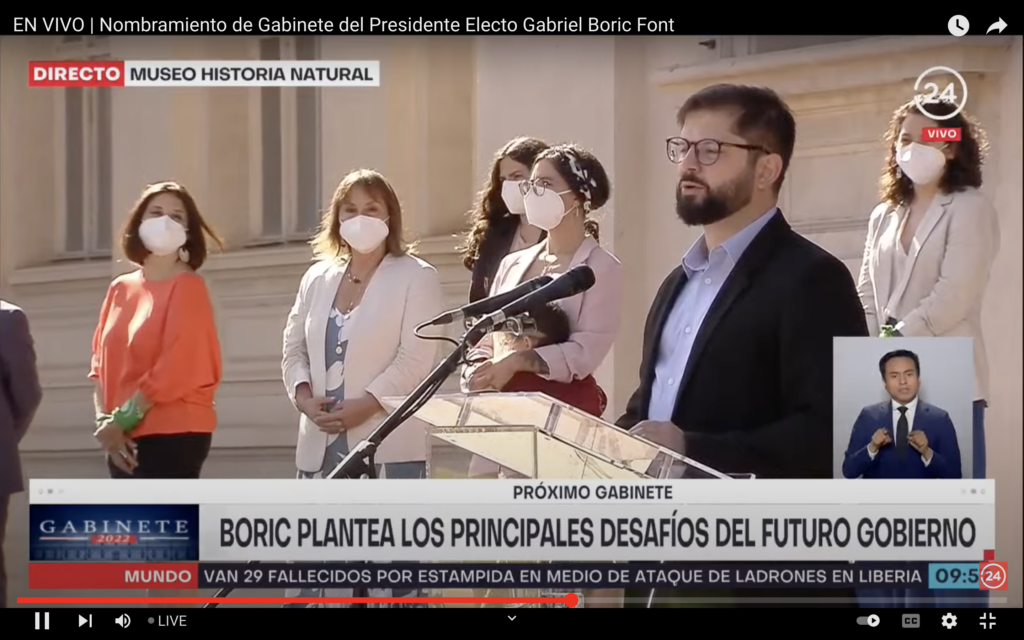On Jan. 21, Chilean President-elect Gabriel Boric presented the members of his cabinet. Among the most highly-anticipated positions was that of the finance minister, a post that went to current head of the Central Bank Mario Marcel. Chilean markets rallied after the announcement, indicating the private sector’s relief with an economist known for fiscal responsibility as the head of the finance ministry.
AQ asked observers to share their reaction to the choice of Marcel, and their thoughts on what lies ahead for the Boric administration.
Isabel Aninat, dean of the law school at Adolfo Ibáñez University and director of the Chilean Society for Public Policy:
I think it shows a very good signal from President-elect Boric in terms of his commitment to fiscal responsibility. He has said so in his speeches in recent weeks, but with Marcel in this office, it shows very clearly that Boric is committed to what he has stated.
Marcel has shown, especially over the last few years as president of the Central Bank, a very strong commitment to fiscal responsibility, but also not afraid to express opinions even when they are unpopular. We saw that very clearly with the withdrawal of the pension funds that were discussed and in many cases approved over the last few years during the pandemic. At times, he has been very vocal against the political majority. I think that’s why he is a great name for the office he has been named to. Marcel also knows the ministry very well – he was the head of Chile’s budget office within the finance ministry for several years.
Over the next few months, we should keep an eye on the political ministries that work closely with the president and are located in La Moneda. I think we will probably observe some tension between the political ministries and the finance ministry. This is a very important question as we enter economic discussions: Who will have more weight over these decisions? We have seen this before: It was very clear, for example, in the second government of President Bachelet, when Minister of Finance Rodrigo Valdés faced this tension, and then he resigned. That is one thing to watch: The relationship between Mario Marcel and the rest of the cabinet, especially the political ministries.
Brian Winter, editor-in-chief of Americas Quarterly:
There’s tremendous relief about Chile on Wall Street today. And the people who spent 2021 insisting that Gabriel Boric was the second coming of Nicolás Maduro have egg on their faces. As I wrote in December, Boric’s model is Sweden or France, not Venezuela.
We should still expect a left-of-center government, of course. Boric has a mandate for change, and he will likely do things in the pension and mining sectors, for example, that business won’t like. The new Constitution could still chart out a more radical course. The size of the Chilean state will grow.
But this pluralistic Cabinet, especially the appointment of Marcel, is a huge signal. It means at least some elements of Chile’s post-1990 macroeconomic framework will remain in place. You could say that Boric found his version of Antonio Palocci, the Brazilian finance minister whom Luiz Inácio Lula da Silva appointed in his first term, in 2003. Naming a safe pair of hands to maintain macro and fiscal stability allowed Lula to avoid a market panic – and eventually gave him the resources to accomplish his progressive goals.
There’s another potential parallel: Lula’s shift to the center angered part of his base, leading to the creation of the hard-left PSOL party. You have to wonder if Boric will face a similar backlash, especially among the Communists. Balancing Chileans’ demand for change, while keeping the economy strong, will remain a tremendous challenge.

Tags: Chile, Gabriel Boric

